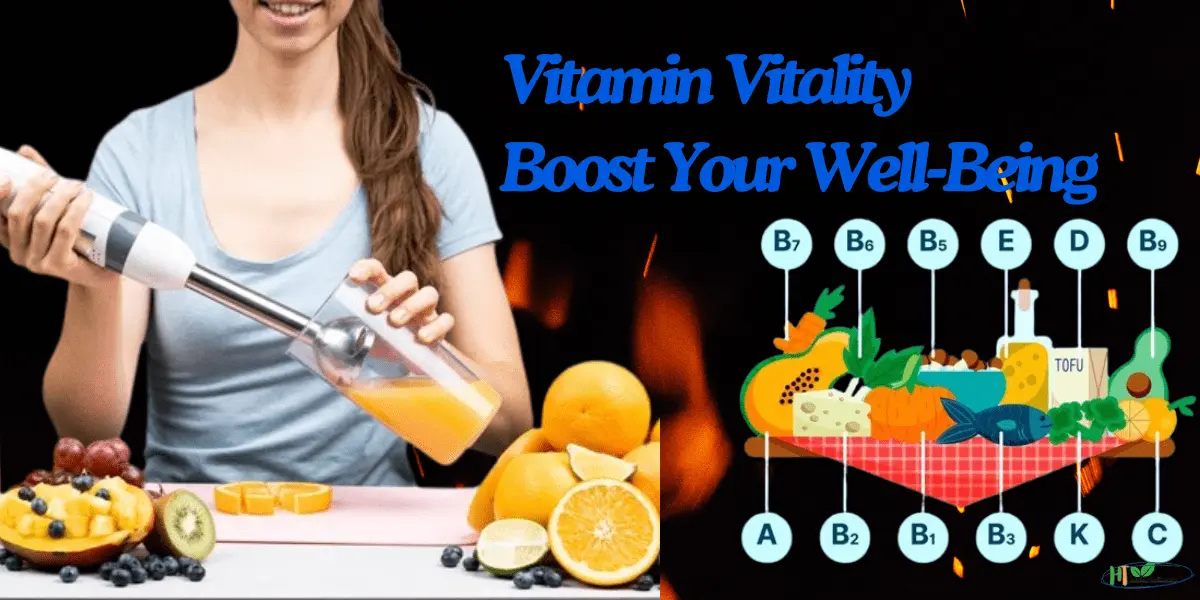Vitamin Vitality refers to the vibrant health and energy that result from consuming food rich in essential vitamins. we experience increased vitality, improved mood and overall well-being.
Introduction:
In the journey to optimal health, the role of essential vitamins cannot be underestimated. These micronutrients play important roles in a variety of bodily functions, from supporting the immune system to promoting healthy skin and vision. Although supplements are readily available, the real powerhouse of vitamins is in the foods we eat. In this comprehensive guide, we delve into the world of vitamins for vitality, exploring how you can boost your well-being through a balanced diet rich in essential nutrients.
What is vitamin vitality?
Vitamin Vitality refers to the vibrant health and energy that result from consuming food rich in essential vitamins to vitamin vitality. These micronutrients are essential for maintaining optimal bodily function, supporting everything from metabolism to cellular repair. When our body receives an adequate supply of vitamins, we experience increased vitality, improved mood and overall well-being.
Why are essential vitamins important?:
Essential vitamins are important for maintaining health and preventing various diseases. For example, vitamin C acts as a powerful antioxidant, protecting cells from free radical damage and boosting the immune system. Vitamin D plays a vital role in maintaining strong bones by aiding in the absorption of calcium. B vitamins play an important role in energy production, nerve function and red blood cell synthesis.
How to Improve Your Health with Essential Vitamins:
The best way to get essential vitamins is through a varied and balanced diet. Here are some tips to help improve your health with vitamin-rich foods:
1. Eat the rainbow:
Eat a variety of fruits and vegetables in different colors to ensure you’re getting plenty of vitamins and minerals. Diversify your diet by eating a variety of fruits and vegetables. Each vibrant color symbolizes a unique set of vitamins and minerals essential to your well-being. From the deep green of spinach to the fiery orange of carrots, each color provides a variety of nutrients. By consuming this colorful palette, you ensure a wide intake of essential vitamins and minerals, providing your body with the variety of nutrients it needs. So, make your plate a canvas of color to paint a picture of health and vitality with each delicious dish.
2. Include super-foods:
Include nutrient-dense super-foods like kale, spinach, berries and avocados in your diet to maximize your vitamin intake. Boost your nutrition by including nutrient-dense super-foods in your diet. Kale, spinach, berries and avocado are among the elite class of super-foods rich in vitamins, minerals and antioxidants.
These nutritional powerhouses not only boost your vitamin intake but also provide many health benefits, from boosting immunity to improving heart health. By making them a staple in your diet, you maximize your nutrient intake, giving your body the nutrients it needs to thrive. So, enjoy the goodness of super-foods and nourish yourself from the inside out for optimal health and vitality.
3. Choose whole grains:
Choose whole grains like quinoa, brown rice and oats, which are rich in B vitamins and other essential nutrients (vitamin vitality). When it comes to grains, choose whole grains like quinoa, brown rice, and oats to boost your nutrient intake. Unlike refined grains, whose outer layers are removed during processing, whole grains keep all parts of the grain kernel intact, including the bran, germ, and endosperm. This means they are rich in fiber, vitamins, minerals and antioxidants.
Whole grains are especially rich in B vitamins, including thiamin (B1), riboflavin (B2), niacin (B3), and folate (B9), which are essential for energy production, metabolism, and nerve function. In addition, they provide an important source of minerals such as magnesium, iron and selenium, which are important for maintaining overall health.
Quinoa, known as a complete protein, provides all nine essential amino acids, making it an excellent choice for vegetarians and vegans. Brown rice is rich in manganese, which supports bone health and metabolism, while oats are renowned for their beta-glucan fiber, which helps lower cholesterol levels and stabilize blood sugar.
By including whole grains in your diet, you not only increase the amount of nutrients you need, but also promote digestive health, reduce the risk of chronic diseases like heart disease and diabetes, and maintain steady energy levels throughout the day. So, switch to whole grains and take advantage of the countless benefits they provide for your overall well-being.
4. Don’t forget protein:
Include lean sources of protein like fish, chicken, tofu and legumes, which provide essential amino acids and vitamin B12.
Protein is an essential component of a balanced diet, important for supporting various bodily functions and maintaining overall health.
When choosing a protein source, choose lean options like fish, chicken, tofu and legumes to maximize nutritional benefits.
Fish, especially fatty varieties like salmon and mackerel, are rich in omega-3 fatty acids, which are essential for heart health, brain function and reducing inflammation. Chicken and turkey, like chicken, provide a good source of protein along with important nutrients like iron and zinc, which are essential for immune function and metabolism.
Tofu, derived from soybeans, is a versatile plant-based protein that provides all nine essential amino acids, making it an excellent choice for vegetarians and vegans. Additionally, tofu is rich in calcium and iron, which are important for bone health and oxygen transport in the blood.
Legumes, including beans, lentils and chickpeas, are nutritional powerhouses rich in protein, fiber, vitamins and minerals. They provide essential amino acids, as well as B vitamins such as folate and B12, which are important for energy metabolism and red blood cell formation.
By including a variety of lean protein sources in your diet, you not only meet your body’s protein requirements but also ensure a diverse range of nutrients essential for optimal health. Therefore, do not ignore the importance of protein in your diet and adopt these nutritious options for a balanced diet.
5. Dairy products and alternatives:
Include dairy products or fortified alternatives like almond milk and soy milk to ensure adequate intake of calcium and vitamin D. Dairy products in your diet or fortified alternatives like almond milk and soy milk are essential to ensure adequate calcium and vitamin D intake, both of which are important for bone health and overall well-being.
Dairy products like milk, yogurt and cheese are rich sources of calcium, a mineral that is important for building and maintaining strong bones and teeth. Additionally, dairy products provide protein, potassium and other essential nutrients needed for optimal health. However, for those who are lactose intolerant or wish to avoid dairy for other reasons, fortified alternatives such as almond milk and soy milk provide comparable nutritional benefits.
These plant-based milk alternatives are often enriched with calcium and vitamin D, providing levels of these nutrients similar to dairy products. For example, almond milk is naturally low in calories and contains heart-healthy fats, making it a popular choice among those looking for a dairy-free alternative. Similarly, soy milk is rich in protein and contains nine essential amino acids, making it a nutritious alternative to dairy milk.
By including dairy products or fortified options in your diet, you can ensure that your body gets the calcium and vitamin D it needs to support bone health, increase muscle function and maintain overall health.

FAQ: Vitamin Vitality
Q: Can I not take vitamin supplements without paying attention to food? Answer: Although supplements can be useful for filling gaps in your diet, they should not replace whole foods. Whole foods contain a complex array of nutrients that work synergistically to support health, whereas supplements may lack this complexity for vitamin vitality.
Q: How can I tell if I am deficient in certain vitamins? Answer: Common symptoms of vitamin deficiency include fatigue, weak immune system, poor wound healing and changes in vision. However, it is important to consult a health care professional for proper diagnosis and treatment.
Q: Should I avoid certain foods for optimal vitamin intake? Answer: While it is important to focus on nutrient-rich foods, there are no specific foods you should avoid for optimal vitamin intake. Strive for a balanced and moderate approach to your diet instead.
Q: Is it possible to obtain all the necessary vitamins solely from food? Answer: In most cases, yes. A varied and balanced diet consisting of fruits, vegetables, whole grains, lean proteins and dairy products can provide your body with all the vitamins it needs for optimal health.
Conclusion:
Optimal health and vitality are within reach when you prioritize essential vitamins in your diet. By including a variety of nutrient-rich foods in your diet, you can unlock the full potential of vitamins’ vitality and experience transformative effects on your well-being. Remember, food isn’t just fuel – it’s medicine for the body and soul. Embrace the power of vitamin-rich foods and embark on a journey to a healthier, happier life with vitamin vitality.
Achieving optimal health and vitality is a journey that begins with the choices we make about what we put into our bodies. Essential vitamins are the foundation upon which this journey rests, playing a vital role in supporting countless bodily functions that contribute to overall well-being. When we prioritize a variety of nutrient-rich foods in our diets, the full potential of what we call “vitamin vitality” is realized.
Vitamin Vitality encompasses the transformative effects that essential vitamins can have on our health and vitality when consumed in abundance through whole foods. These micronutrients act as catalysts within the body, facilitating processes essential for vitality, such as energy production, immunity and cellular repair.
By adopting the vitality concept of vitamins, we believe that food is not just fuel for our bodies, but medicine for both our physical and mental well-being. Every bite we take is an opportunity to nourish ourselves from within, providing our bodies with the nutrients they need to thrive.
But what does it mean to include a variety of nutritious foods in our diet? This means choosing whole, minimally processed foods that are naturally rich in vitamins, minerals, antioxidants and other beneficial compounds. Think vibrant fruits and vegetables, whole grains, lean proteins, dairy products and healthy fats.
For example, fruits like berries are rich in vitamin C, which supports immunity and collagen production, while vegetables like spinach are rich in vitamin K, which is essential for bone health and blood clotting. Whole grains like quinoa and brown rice provide abundant B vitamins, which play an important role in metabolism and energy production. Lean proteins like fish and poultry provide essential amino acids, while dairy products provide concentrated sources of calcium and vitamin D for strong bones and teeth.
When we make a conscious effort to fill our plates with these nutrient-rich foods, we nourish not only our bodies, but our minds and spirits. We feel stronger, more flexible and more alive. We sleep better, we think more clearly, and we experience a sense of overall well-being that radiates from within.
So, I encourage you to embrace the power of vitamin-rich foods and begin your journey toward a healthier, happier life. Start small by adding one or two nutrient-rich foods to your diet each day and gradually build on that foundation. With each bite, you’ll nourish not only your body, but your soul as well, and the benefits are nothing short of transformational.
Read again if need : Vitamin Vitality: Boost Your Well-Being with Essential Vitamins for Optimal Health only through foods.

